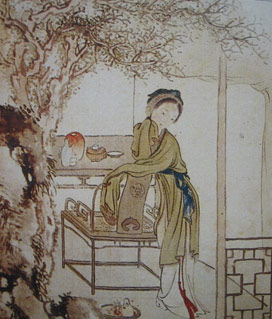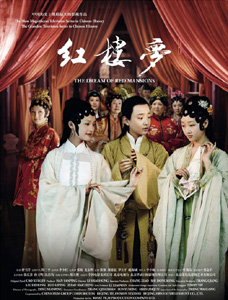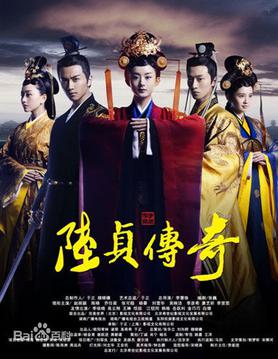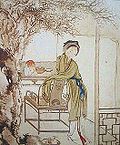Related Research Articles

Dream of the Red Chamber or The Story of the Stone is an 18th-century Chinese novel authored by Cao Xueqin, considered to be one of the Four Great Classical Novels of Chinese literature. It is known for its psychological scope and its observation of the worldview, aesthetics, lifestyles, and social relations of High Qing-era China.
Lady Wang (王夫人) is a character in the classic Chinese 18th century novel Dream of the Red Chamber. She is the wife of Jia Zheng, and mother of Jia Zhu, Jia Yuanchun and Jia Baoyu. She is the elder sister of Aunt Xue and hence the maternal aunt to Xue Baochai and Xue Pan.

Xue Baochai is one of the principal characters in the classic 18th century Chinese novel Dream of the Red Chamber. Described as extremely beautiful and socially graceful, her attributes complement those of her cousin Lin Daiyu. Indeed, it has been suggested that the two women are complements of one another – each has exactly the attributes of Cao Xueqin's ideal woman which the other lacks.
Jia Nanfeng, nicknamed Shi (峕), was a Chinese empress consort. She was a daughter of Jia Chong and the first wife of Emperor Hui of the Jin dynasty and also a granddaughter of Jia Kui. She is commonly seen as a villainous figure in Chinese history, as the person who provoked the War of the Eight Princes, leading to the Wu Hu rebellions and the Jin Dynasty's loss of northern and central China. Between 291 to May 300, she ruled the Jin empire from behind the scenes by dominating her developmentally disabled husband.

Romance of the Three Kingdoms is a Chinese television series adapted from the classical 14th century novel of the same title by Luo Guanzhong. The series was produced by China Central Television (CCTV) and was first aired on the network in 1994. It spanned a total of 84 episodes, each approximately 45 minutes long. One of the most expensive television series produced at the time, the project was completed over four years and involved over 400,000 cast and crew members, including divisions of the People's Liberation Army from the Beijing, Nanjing and Chengdu military regions. Some of the dialogue spoken by characters was adapted directly from the novel. Extensive battle scenes, such as the battles of Guandu, Red Cliffs and Xiaoting, were also live-acted.
Xue Ji, courtesy name Sitong (嗣通), was a Chinese calligrapher, painter, and politician of the Tang dynasty, briefly serving as chancellor during the reign of Emperor Ruizong. He was considered one of the four greatest calligraphers of early Tang, along with Yu Shinan, Ouyang Xun, and Chu Suiliang.
Grandmother Jia, née Shi, so often also called Dowager Shi or simply the Dowager, is a major character in the 18th century Chinese novel Dream of the Red Chamber. She is the daughter of Marquis Shi of Jinling. She is also Baoyu and Daiyu's grandmother and the oldest and most respected authority of the Jia Clan. A doting figure, it was she who arranged for Daiyu, her only "outside" grandchild, to come to the Rongguo Mansion. It was with her help that Baoyu and Daiyu became extremely close as childhood playmates, and eventually, kindred spirits and lovers.

Dream of the Red Chamber, first released in 1987, is a television series produced by CCTV adapted from the classic 18th century Chinese novel Dream of the Red Chamber. It gained enormous popularity for its music, cast, and plot adaptation. It was first filmed in Beijing in Mandarin, then the series was dubbed in Cantonese and Shanghainese. The series is 36 episodes long.
Herman Kwan Hoi-San was a Hong Kong actor. His English name was Herman Kwan. Kwan started off as a Cantonese opera actor in street theatre before joining New Voice Opera Troupe (新聲劇團). He also started singing for early Hong Kong film soundtracks and moved on to act in films, mostly adaption of opera in Cantonese. He became famous and acted in many lead roles. When Hong Kong films started to move towards Mandarin, Kwan's career faltered and joined TVB and acted in various roles. Directors and filmmakers rediscovered his talent and cast him in many supporting roles in films. In 2001, Kwan suffered a stroke and was left mute and paralysed. He died in 2006.

The Water Margin is a 1998 Chinese television series adapted from Shi Nai'an's classical 14th-century novel of the same title. It was produced by CCTV with Zhang Jizhong as producer. It was first broadcast in China in January 1998. The series also featured action choreography by Yuen Woo-ping.

All Men Are Brothers is a 2011 Chinese television series adapted from Shi Nai'an's 14th century novel Water Margin, one of the Four Great Classical Novels of Chinese literature. The series is directed by Kuk Kwok-leung and features cast members from mainland China, Taiwan and Hong Kong. The series was first broadcast on 8TV in March 2011 in Malaysia.

The Dream of Red Mansions is a 2010 Chinese television series, produced by Han Sanping and directed by Fifth Generation director Li Shaohong. It is a new adaptation of the classic 18th century novel Dream of the Red Chamber. The series, comprising 50 episodes, made its debut on 6 July 2010 on 9 terrestrial networks across China.

Lady Wu: The First Empress, also known as The Great Empress or Empress Wu Meiniang, is a 2003 Chinese television series based on the biography of Wu Zetian, the only woman in Chinese history to assume the title of Empress Regnant. The series was first broadcast on CTS in Taiwan in 2003 under the Chinese title 武媚娘傳奇.

Outlaws of the Marsh is a Chinese television series adapted from Shi Nai'an's classical 14th century novel Water Margin. It was first broadcast on Shandong TV in China in 1983, and was not completed until 1986. The series was one of the earliest television dramas with an ancient China setting to be produced in mainland China. It was divided into different parts, each focusing on the story line of a certain character. Widely regarded, as a classic in mainland China, the series won a Golden Eagle Award.

Wu Zetian is a Chinese television series based on the life of Wu Zetian, the only woman in Chinese history to assume the title of Empress Regnant and became the de facto ruler of China in the late seventh century. Directed by Chen Jialin, the series starred Liu Xiaoqing as the title character. It was first broadcast on CCTV in China in 1995 and subsequently aired by television stations in other countries.
Wang Yanjun, known as Wang Lin from 933 to 935, also known by his temple name as the Emperor Huizong of Min (閩惠宗), used the name of Xuanxi (玄錫) while briefly being a Taoist monk, was the third monarch of Min during the Five Dynasties and Ten Kingdoms period of China, and the first ruler of Min to use the title of emperor.

Legend of Lu Zhen is a 2013 Chinese television series based on the novel Female Prime Minister (女相) by Zhang Wei. Directed by Li Huizhu, Zheng Wei'en and Liang Guoguan and produced by Yu Zheng and Mu Xiaohui, the series stars Zhao Liying and Chen Xiao. It was first broadcast on 5 May 2013 in China and subsequently aired in other Asian countries such as South Korea and Japan.
Court Lady is a 2021 Chinese television series produced by Yu Zheng, starring Xu Kai and Li Yitong.

Fake Princess is a 2020 Chinese television series starring Zhao Yiqin, Eleanor Lee, Garvey Jin and Chen Si Yu. The series aired on Mango TV from May 17 to June 1, 2020.
References
- ↑ "SFOpera – San Francisco Opera Presents World Premiere of Dream of the Red Chamber" . Retrieved 20 July 2016.
- ↑ "S.F. Opera to Premiere Work Based on Chinese Classic – San Francisco Classical Voice" . Retrieved 20 July 2016.
- ↑ Building the Dream of the Red Chamber. Bright Sheng & David Henry Hwang on YouTube, Institute for Advanced Study, University of Minnesota, 26 January 2016
